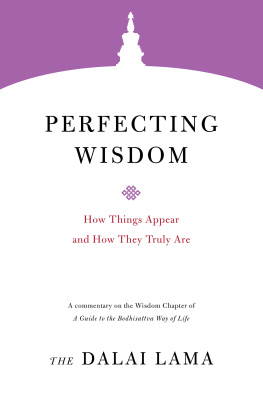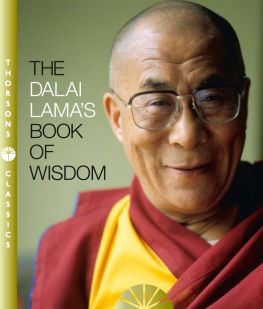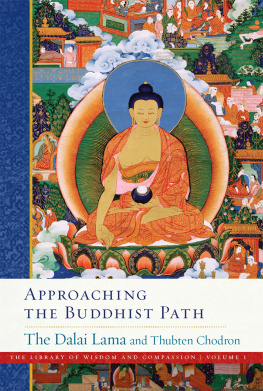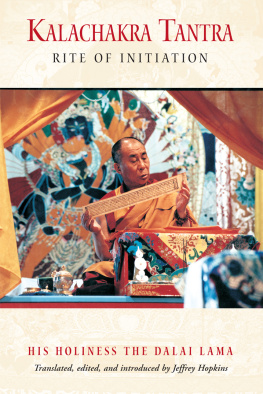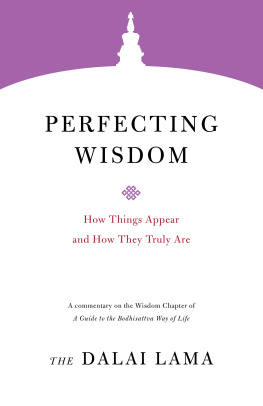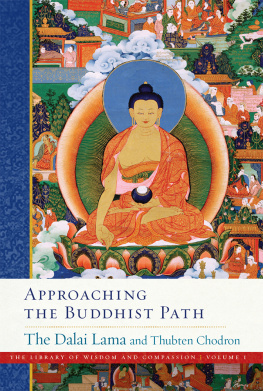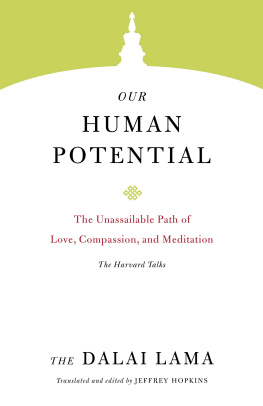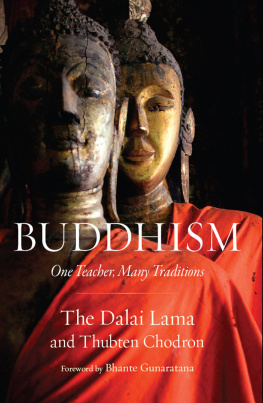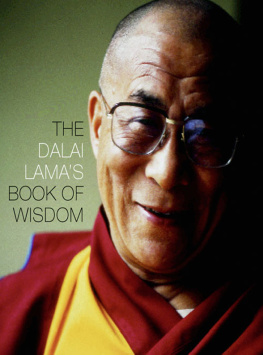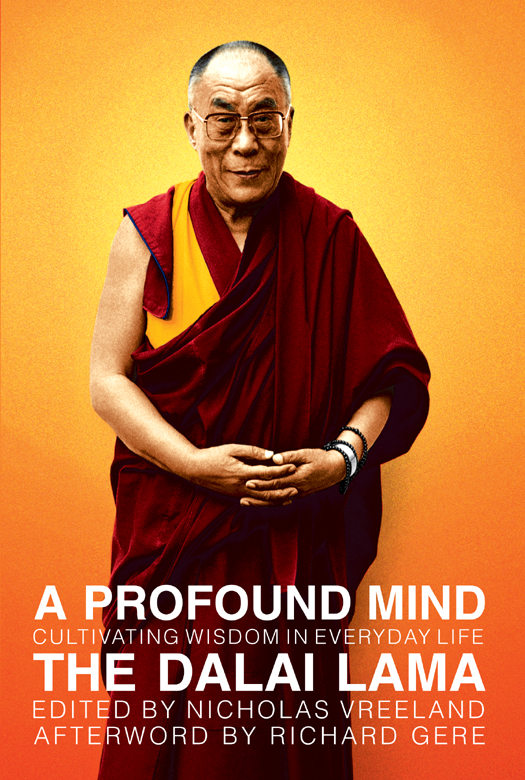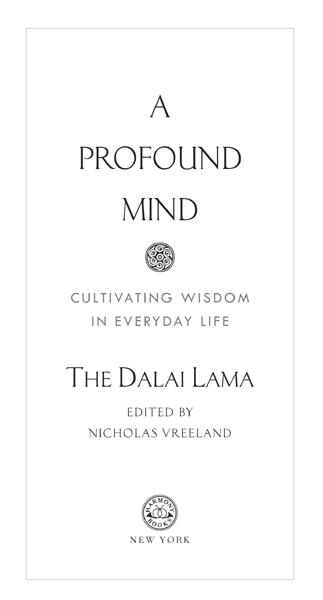Also by the Dalai Lama
M Y L AND AND M Y P EOPLE
F REEDOM IN E XILE
E THICS FOR THE N EW M ILLENNIUM
A N O PEN H EART
T HE U NIVERSE IN A S INGLE A TOM
T OWARD A T RUE K INSHIP OF F AITHS
Copyright 2011 by The Dalai Lama
Foreword copyright 2011 by Nicholas Vreeland
Afterword copyright 2011 by Richard Gere
All rights reserved.
Published in the United States by Harmony Books, an imprint of the Crown Publishing Group, a division of Random House, Inc., New York.
www.crownpublishing.com
HARMONY BOOKS is a registered trademark and the Harmony Books colophon is a trademark of Random House, Inc.
Library of Congress Cataloging-in-Publication Data is available upon request.
eISBN: 978-0-307-95244-8
Jacket design by Lloyd & Co.
Jacket photography by Nicholas Vreeland
v3.1
C ONTENTS
F OREWORD

PERHAPS THE CHIEF difference between Buddhism and the worlds other major faith traditions lies in its presentation of our core identity. The existence of the soul or self, which is affirmed in different ways by Hinduism, Judaism, Christianity, and Islam, is not only firmly denied in Buddhism; belief in it is identified as the source of all our misery. The Buddhist path is fundamentally a process of learning to recognize the essential nonexistence of the self, while seeking to help others to recognize it as well.
A mere acknowledgment of the nonexistence of any core self will not free us from our difficulties. We must cultivate a profound mind by deepening our understanding and strengthening it through contemplation and logical study.
And for this profound mind to evolve into the omniscient mind of a Buddha capable of effectively directing others on their paths to enlightenment, it must be motivated by more than a wish for our own peace.
In 2003, Khyongla Rato Rinpoche, founder of Kunkhyab Thardo Ling (Land Pervaded by Seekers of Liberation, otherwise known as The Tibet Center), joined with Richard Gere and his charitable organization Healing the Divide to invite His Holiness the Dalai Lama to New York City. They asked the Dalai Lama if he would speak in particular on the Buddhist view of selflessness, as expounded in Root Verses on Indian PhilosophiesThe Lions Roar, a seventeenth-century Tibetan text by Jamyang Shepa, a scholar distinguished for his knowledge of the different philosophical views extant in India in Buddhisms heyday. In order that His Holinesss lectures include a practical aspect, they also asked that he speak on the meditative technique outlined in Seven Point Mind Training, a brief work composed in the twelfth century by the renowned Tibetan practitioner Chekawa Yeshe Dorje.
A few years later, in 2007, Khyongla Rato Rinpoche and Richard Gere again invited His Holiness to New York, this time to present a teaching on the Diamond Cutter Sutra, a classic discourse by the Buddha on the emptiness of inherent existence of all that exists. The Dalai Lama also included in this visit an exposition on Seventy Verses on Emptiness, by Nagarjuna, the second-century Buddhist philosopher considered by many to be the greatest single explicator of the Buddhas often challenging and seemingly paradoxical teachings on emptiness.
Throughout all these talks His Holiness sought not only to lead his listeners through the complexities of the Buddhist doctrine of selflessness, but to show them how to bring these teachings actively into their own lives. It is by actually living these teachings that we allow them to bring about a genuine transformation in our perception of ourselves and our lives.
This book comes out of those talks, all wonderfully translated by Geshe Thupten Jinpa. It is offered in the earnest hope that it may further the understanding in the West of the Buddhist doctrine of selflessness and its usefulness in living a more meaningful and happy life.
I would like to extend my profound thanks to all those who have helped me in the preparation of this volume, and to assure the reader that any errors he or she may find within are purely my own.
Nicholas Vreeland
I NTRODUCTION


IT IS MY hope that in this book we can explore the true beliefs of Buddhism so that misconceptions might be dispelled. I also hope that for those of you who are practitioners of another religion, this book might help you come to understand the beliefs of a fellow religious tradition. If there is anything you wish to incorporate into your practice, I hope that you will do so.
We will look at some of the philosophical interpretations of the teachings of Lord Buddha over 2,500 years ago and will examine topics such as emptiness and dependent origination. We will then discuss how to cultivate these as well as the altruistic mind of enlightenment that in Sanskrit we call Bodhicitta.
As we progress, we must apply what we learn. There is a Tibetan saying that there should be no gap so large between our mental state and what is being taught that we could fall through it. As you read, I hope that you will relate what you are hearing to your own personal experience; as I teach, I try to do the same.
If the material that I am trying to impart remains opaque to me, how can I possibly convey its meaning to others? Though I cant claim to have great mastery of the subjects we are discussing here, with subject matter as important as I feel this is, even a mediocre understanding is much better than none at all. However, as a result of your reading a book that stems from my mediocre understanding, you can only hope to gain an understanding that will be half knowledge and half ignorance. But this, too, is much better than no understanding at all!
CHAPTER 1
D IVERSE S PIRITUAL T RADITIONS


BUDDHISTS BELIEVE THAT we are responsible for the quality of our lives, our happiness, and our resources. In order to achieve a meaningful life we must transform our own emotions, as this is the most effective way to bring about future happiness for ourselves and for all others.
No one can force us to transform our minds, not even the Buddha. We must do so voluntarily. Therefore Buddha stated, You are your own master.
Our efforts must be realistic. We must establish for ourselves that the methods we are following will bring about our desired results. We cant merely rely on faith. It is essential that we scrutinize the path we intend to follow to establish clearly what is and what is not effective, so that the methods of our efforts may succeed. This, I believe, is essential if we wish to find any true happiness in life.
I hesitate to tell you about a spiritual tradition that is not your own. There exist many fine religions that have, over centuries, helped their followers attain peace of mind and happiness. There may, however, be aspects of Buddhism that you could bring to your spiritual practice.


